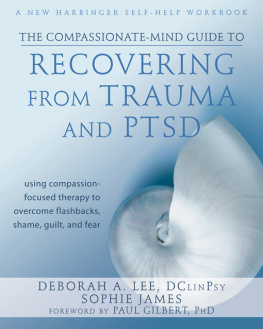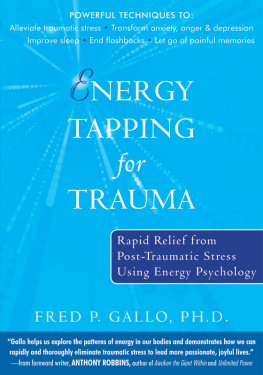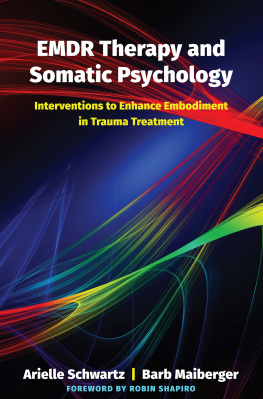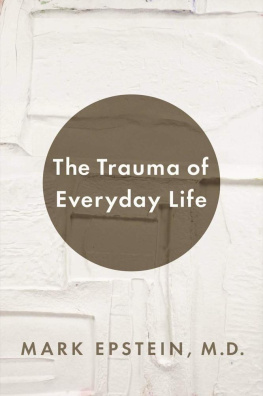Shattered
Assumptions
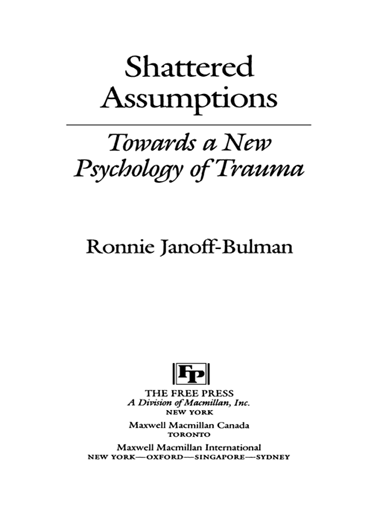
THE FREE PRESS
A Division of Simon & Schuster
1230 Avenue of the Americas
New York, NY 10020
Copyright 1992 by Ronnie Janoff-Bulman
All rights reserved including the right of reproduction in whole of in part in any form.
THE FREE PRESS and colophon are trademarks of Simon & Schuster Inc.
www.SimonandSchuster.com
Manufactured in the United States of America
10 9 8 7 6 5 4 3 2 1
Library of Congress Cataloging-In-Publication Data
Janoff-Bulman, Ronnie.
Shattered assumptions: towards a new psychology of trauma / Ronnie Janoff-Bulman
p. cm.
Includes bibliographical references (p. ) and index.
ISBN: 0-7432-3625-4
ISBN 978-1-451-60372-9
1. Life change eventsPsychological aspects. 2. Adaptability (Psychology) 3. Psychic trauma. 4. VictimsPsychology. I. Title.
BF637.L53J36 1992
155.93dc20 91-34496
CIP
For information regarding special discounts for bulk purchases, please contact Simon & Schuster Special Sales at 1-800-456-6798 or business@simonandschuster.com
Credits
The poem on p. 20 is an excerpt from My Achilles Heart by Andrei Voznesensky. Translated by W. H. Auden in Antiworlds: Poetry by Andrei Voznesensky, edited by Patricia Blake and Max Hayward. Copyright 1966 by Basic Books, Inc. Reprinted by permission of Basic Books, a division of HarperCollins Publishers Inc.
Poem #341 (on p. 99) is from The Complete Poem of Emily Dickinson, edited by Thomas H. Johnson. Copyright 1929 by Martha Dickinson Blanche. Copyright renewed 1957 by Mary L. Hampson. By permission of Little, Brown and Company. Reprinted by permission of the Publishers and the Trustees of Amherst College from The Poems of Emily Dickinson, edited by Thomas H. Johnson, Cambridge, MA: The Belknap Press of Harvard University Press. Copyright 1951, 1955, 1979, 1983 by the President and Fellows of Harvard College.
Lines from the poem Musee des Beaux Arts (on p. 155) are excerpted from W. H. Auden: Collected Poems by W. H. Auden, ed. by Edward Mendelson. Copyright 1940 and renewed 1968 by W. H. Auden. Reprinted by permission of Random House, Inc.
The lines from Humpty Dumpty (p. 174) are reprinted from Collected Poems (1930-1973) by May Sarton, by permission of W. W. Norton & Company, Inc. Copyright 1974 by May Sarton.
To the memory of my wonderful father, whose gifts of love and learning are always with me
Contents
PART ONE
Background
PART TWO
Impact
PART THREE
Coping
PART FOUR
Conclusion
Acknowledgments
I owe a deep debt of gratitude to many, many people who made this book both a possibility and a reality for me. I am fortunate to have colleagues and friends in my psychology department who are intellectually alive and stimulating, while at the same time emotionally supportive. Their willingness to listen, discuss, and encourage have helped me enormously. I am very grateful to my graduate school mentors and to my many superb students who, over the years, have kept me on my toes and helped me develop my ideas. The openness and insights of the Harvard Trauma Study Group are greatly appreciated; the groups participants have been more helpful than they know. It has truly been a pleasure to work with The Free Press; I never expected the publication process to be so hassle-free. With temendous respect and admiration, I especially want to express my deep gratitude to the many survivors who have taught me so much during these many years of research and writing.
Working in the area of trauma and victimization makes a person acutely aware of lifes gifts, and there is no question that for me lifes greatest gift is my family. I was raisedwith my wonderful older brotherin a home filled with love, learning, joy, and respect, and I will be forever thankful for my very special parents. I miss my father, with his gentle, kind ways, his tolerance and integrity, his wisdom and warmth. I am incredibly fortunate to have a mother who has always been a great role model. She is the original supermom, and I thank her for her love of life, her generosity and caring, her enthusiasm and energy. Since my fathers recent death my mother has taught me a great deal about coping and emotional strength, and she remains an extremely positive force in my life.
I give my greatest thanks to my husband, Michael, who as a partner and father demonstrates the true meaning of sharing. He has helped me with this book more than anyone, from discussing ideas and reading manuscript pages to successfully freeing me from any guilt when I needed time to write. I am deeply grateful for Michaels nurturanceboth intellectual and emotionaland for his selflessness, creativity, responsibility, spontaneity, intelligence, and wit. Even after eighteen years of marriage I continue to find him endlessly fun and interesting.
Last, but certainly not least, I am incredibly grateful to our two terrific children, Jessica and David. I thank them for their thoughtfulness and sensitivity, their laughter and smiles, their pranks and serious discussions, their curiosity and intelligence, their imagination and humor, their understanding and encouragement. They give me more joy than they could ever know.
PART ONE
Background
1
Our Fundamental Assumptions
I n a single day during the fall of 1989, I recall being struck by reports that nineteen high school students were killed when their school bus plunged into a forty-foot chasm in Texas, Hurricane Hugo lashed into the Carolinas, and a jet crashed at LaGuardia Airport in New York. Newscasts have since told us of the sniper death of a teenage girl on a school bus in Massachusetts, a disastrous train crash in London, cyclones and flooding in Bangladesh, earthquakes in California and the Philippines, the mass murder of fourteen women at the University of Montreal, war and devastation in the Persian Gulf, and the death of nine children when a tornado hit a school in upstate New York. These are catastrophes we read about in newspapers or hear about on television or radio. Yet every day countless more are victimized who do not receive such public attention.
Unfortunately, there is no dearth of such extreme events in our world today. Rape, incest, battering, other criminal assaults, the diagnosis of life-threatening disease, the sudden and untimely loss of a loved one, serious accidents, earthquakes, floods, other natural disasters, and combat are all too common. Increasingly, people are exposed to technological disasters such as Three Mile Island and Chernobyl; and we have witnessed mass atrocities in such forms as Nazi concentration camps and the atomic bombings in Hiroshima and Nagasaki. How can we understand the psychological impact and aftermath of these traumatic experiences? How do people come to terms with these events and go on with their lives?
The responses of survivors to extreme life events tell us a great deal about our common human needs, capacities, and illusions. The fundamental properties of a substance or object are often revealed through exposure to extreme conditionsfor example, the familiar compound H2O is more fully understood by its reactions to intense heat and cold. Just as the scientist attempts to understand the nature of elements by experimenting with them under extreme conditions, so, too, the child experiments with people and objects by exploring behavior at the boundaries. How much air can be inflated into the balloon? What are Mom and Dads real limits? Traumatic life events involve reactions at lifes extremes. By understanding trauma we learn about ourselves, victim and nonvictim alike, and begin to become aware of our greatest weaknesses and our surest strengths.



